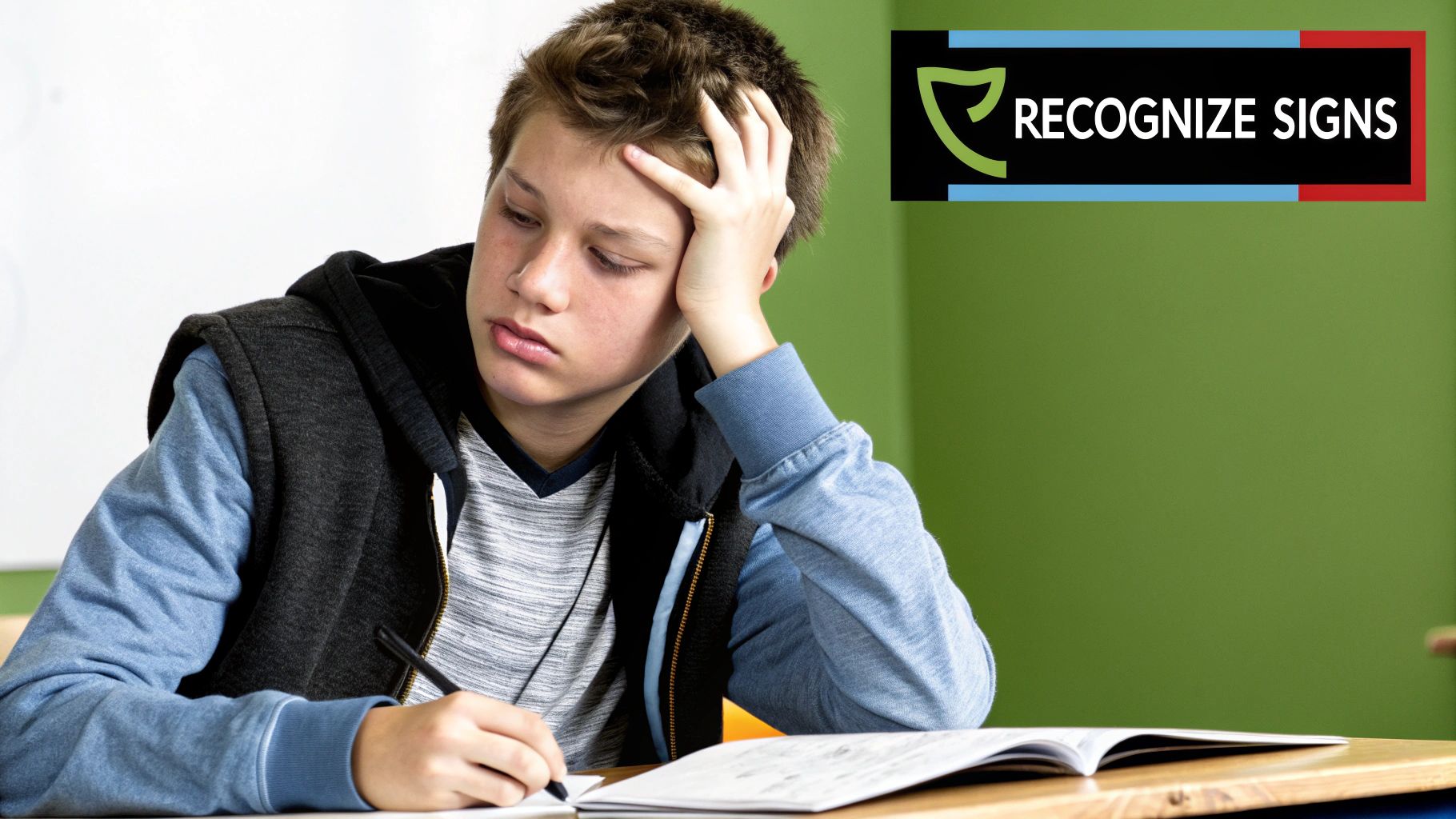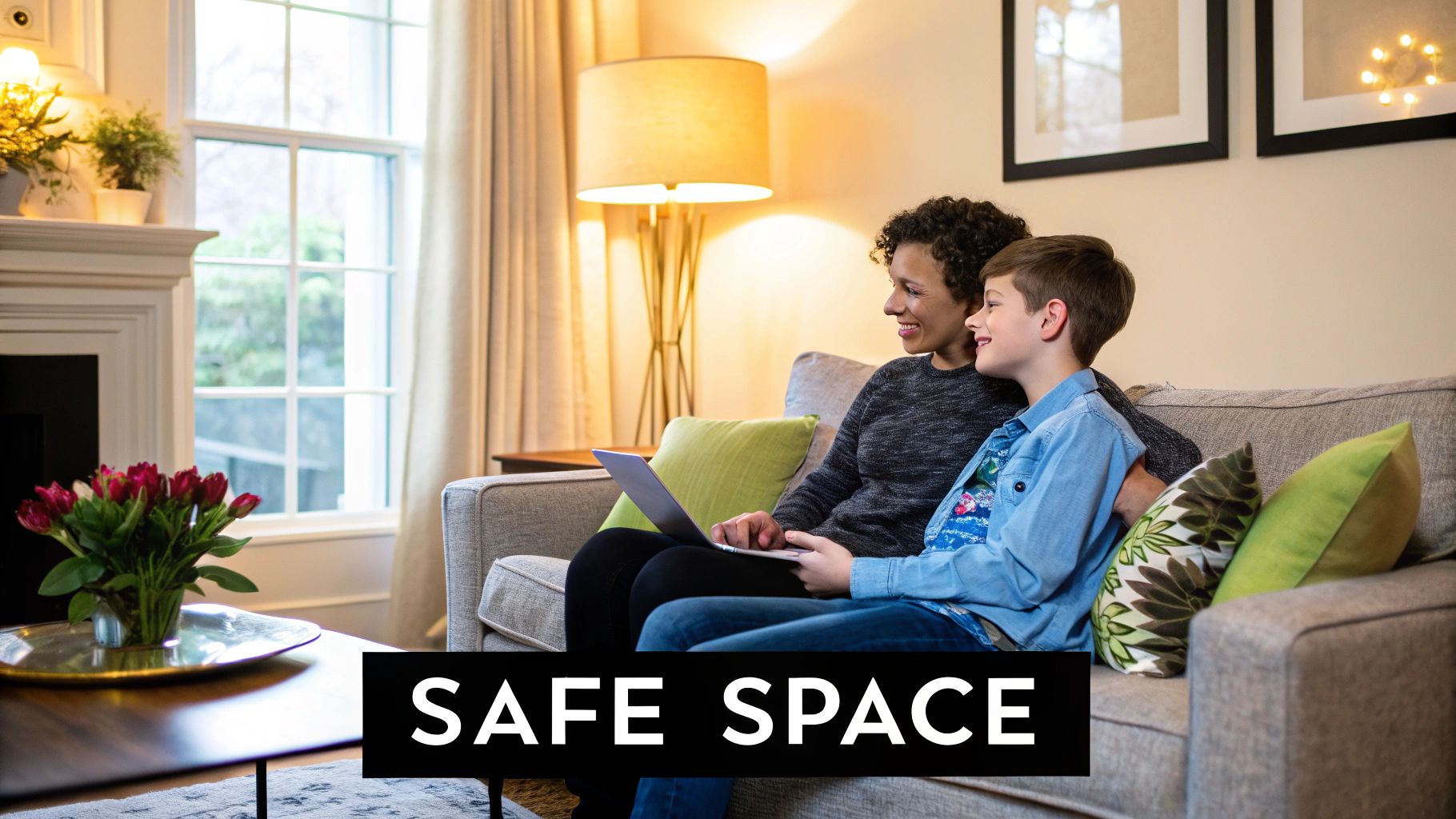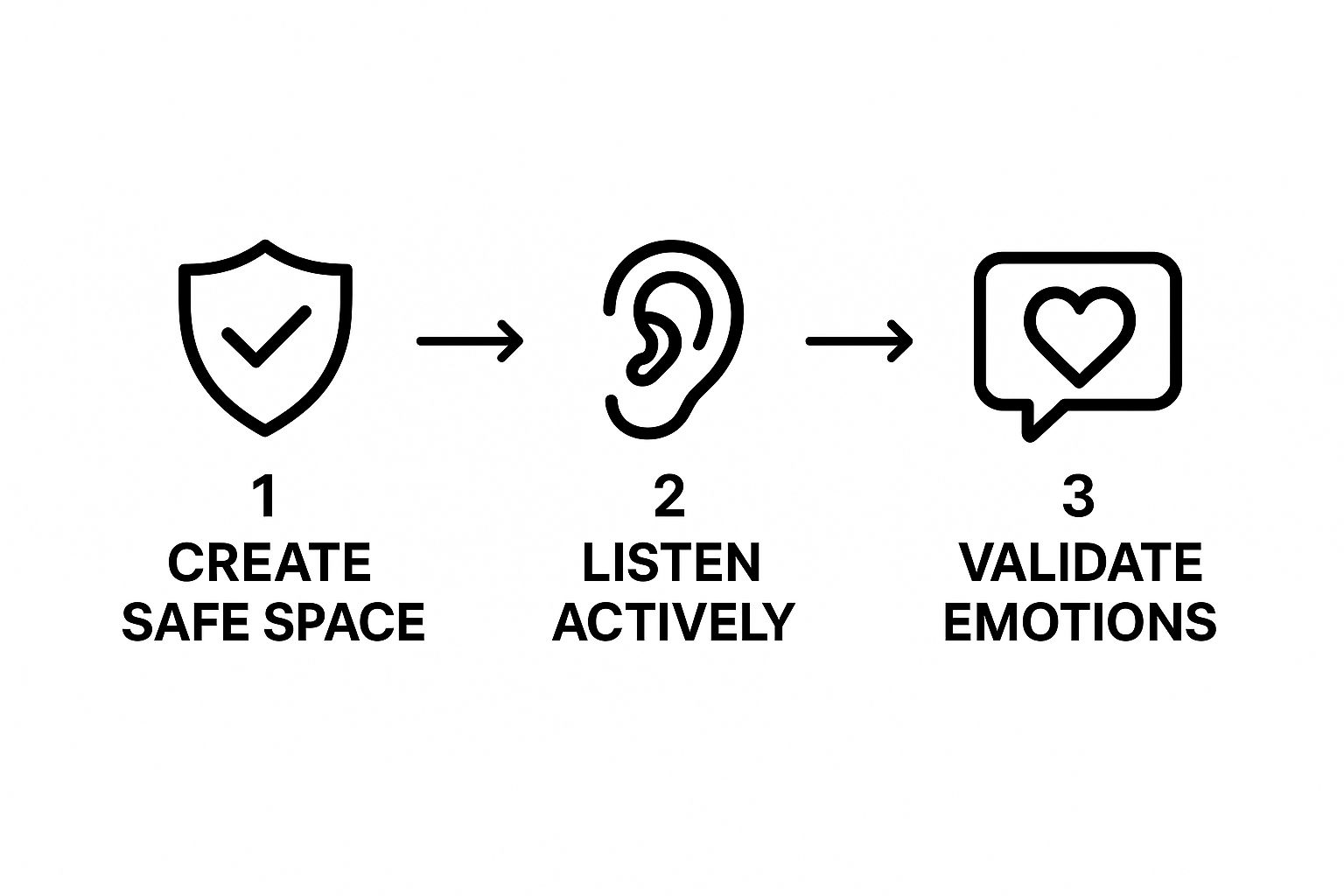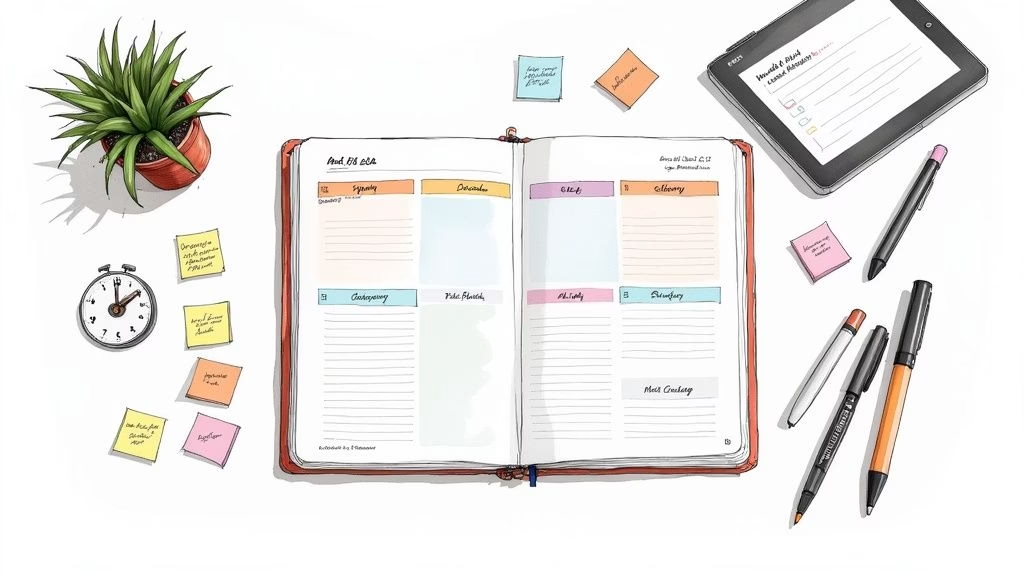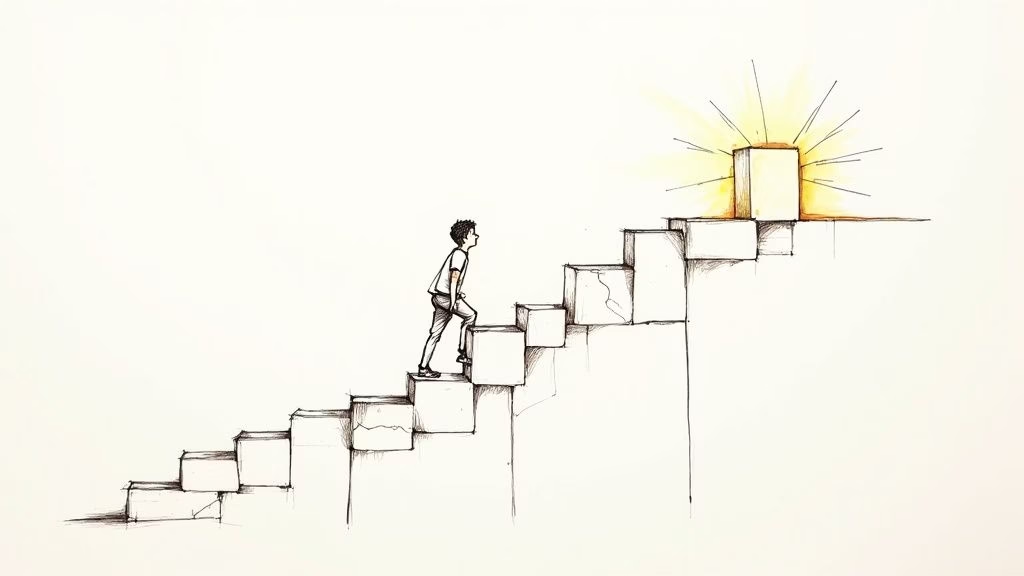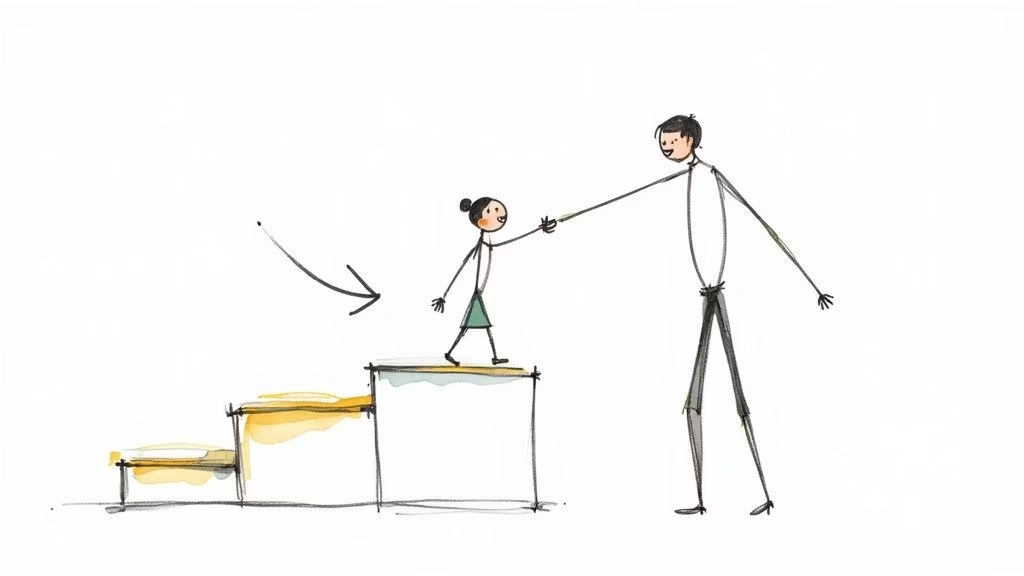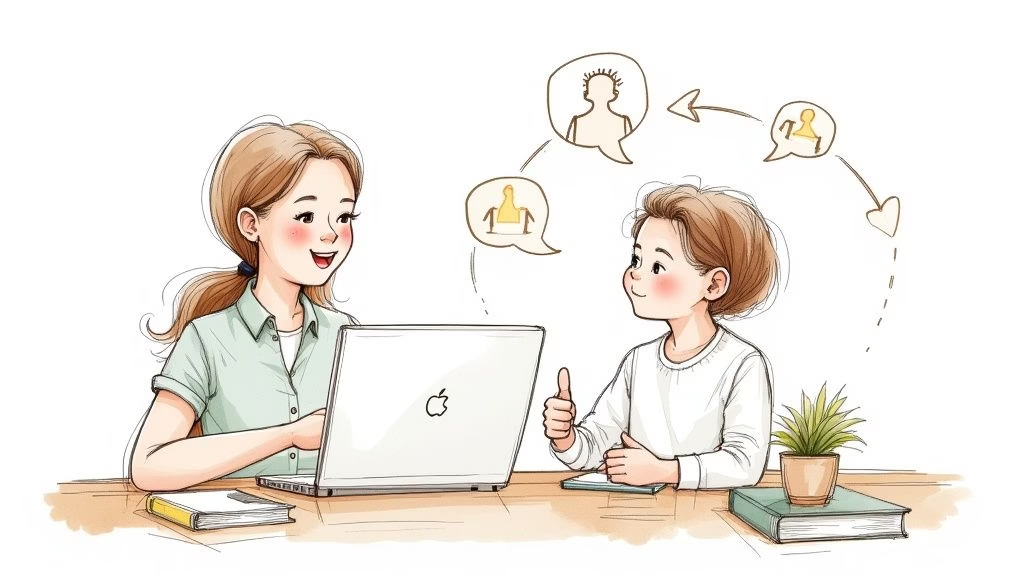Helping your teen navigate anxiety starts with understanding what it actually looks like. It's often more than just stress. The real key is to spot patterns of excessive worry, notice physical symptoms, and recognize behavioral shifts—like pulling away from friends or a sudden drop in grades. Once you see it, you can respond with empathy instead of jumping straight to solutions. This is the foundation for offering real, meaningful support.
Understanding Anxiety in Your Teenager
The first, most critical step for any parent is learning to tell the difference between normal teenage stress and persistent anxiety. Let's be real—adolescence is packed with pressure from school, social circles, and figuring out the future. But when that worry becomes constant and starts getting in the way of everyday life, it's likely more than just a bad week.
Anxiety in teenagers can be sneaky. Some teens will openly talk about their fears, but others might hide their feelings behind anger, irritability, or defiance. Have you noticed them suddenly lose interest in hobbies they once loved? Are they avoiding friends or constantly complaining about stomach aches or headaches? These can all be subtle red flags.
This isn't a small problem. Globally, anxiety disorders in teens are a massive public health issue. Research from the World Health Organization (WHO) shows that anxiety disorders are one of the leading causes of illness and disability among adolescents, with an estimated 3.6% of 10-14 year-olds and 4.6% of 15-19 year-olds experiencing one.
Identifying the Signs of Anxiety
Recognizing the signs is about seeing a pattern, not just a single event. A teen getting nervous before a big exam is totally normal. A teen who can't sleep for weeks because they're constantly worrying about their grades? That's when you know something deeper might be going on.
Keep an eye out for these interconnected symptoms:
- Emotional Changes: Constant worrying, always feeling on edge, having trouble concentrating, or being terrified of making a mistake.
- Physical Symptoms: Frequent headaches, stomach aches, exhaustion, or muscle tension that doesn't seem to have a medical explanation.
- Behavioral Shifts: Dodging social events, putting off schoolwork, a noticeable drop in motivation, or becoming unusually withdrawn and quiet.
Parenting Tip: Trust your gut. If you see a major, concerning shift in your teenager's behavior, it's worth paying attention to. Instead of dismissing their worries, try to understand the "what ifs" that are running on a loop in their mind. Gentle observation is often more effective than direct confrontation.
School, Motivation, and Procrastination
For a lot of teens, school is ground zero for anxiety. The pressure to get good grades, fit in, and perform can feel crushing. This is often where anxiety hits motivation hard and leads directly to procrastination. To an anxious mind, a big project doesn't look like a task—it looks like a giant, looming opportunity to fail. That fear can be paralyzing, making it feel impossible to even start.
This isn't laziness. It's an emotional roadblock.
Once you understand this connection, you can start offering the right kind of support. Instead of harping on the unfinished homework, focus on the feeling that's causing the block. Our guide on how to reduce anxiety offers practical strategies you and your teen can try together. By learning to see these signs for what they are, you're in a much better position to start a real conversation and give them the support they truly need.
Creating a Safe Space for Communication
Talking to your teenager about their mental health can feel like walking on eggshells. The real key to learning how to help a teenager with anxiety is building a foundation of trust where they feel safe enough to actually be vulnerable with you.
That process starts by creating a space where feelings are welcome, not problems to be solved.
Your first instinct might be to jump in with solutions and advice. I get it. We want to fix things for our kids. But jumping in too fast can accidentally send the message that their feelings are an inconvenience. Instead, just listen. When they finally open up, your only job in that moment is to validate what they're saying—even if it sounds completely irrational to you. Their feelings are their reality.
Start with Open-Ended Questions
Direct questions like, "Are you anxious?" almost always get a one-word answer. Usually, "No." A gentler approach is what cracks the door open for a real conversation.
Try using language that's more observational and curious:
- "I've noticed you seem pretty worn out lately. How have things been feeling for you?"
- "It looks like that huge project for school has been on your mind. What's that been like?"
- "I remember how stressful finals were for me. Is anything like that coming up?"
These kinds of questions show you're paying attention without making accusations. They invite your teen to share their side of the story instead of just confirming or denying yours.
Parenting Tip: The goal isn't to get a confession; it's to start a dialogue. Your tone and your patience matter way more than the exact words you use. Just let them know you're there to listen, whenever they're ready.
Practice Active and Empathetic Listening
Once your teen starts talking, fight every urge to interrupt or offer advice right away. Truly hearing them is one of the most powerful things you can do for their mental health. Active listening isn't just about being quiet; it's about showing you actually get it.
So instead of saying, "Don't worry about it," try one of these:
- "That sounds really overwhelming." This validates their stress.
- "It makes total sense that you'd feel that way." This shows empathy.
- "Thanks for telling me this. I know that couldn't have been easy." This shows you appreciate their trust.
When you validate their experience first, you build the trust you need to eventually explore solutions together. This kind of supportive communication is a game-changer, especially when anxiety is zapping their motivation and causing them to procrastinate on schoolwork. It completely shifts the dynamic from you versus their problem to a team tackling the challenge together.
Practical Tools for Managing Daily Anxiety
Knowing how to start the conversation is a huge first step, but what happens next? When anxiety feels like it's taking over, your teen needs practical, in-the-moment tools to get back in the driver's seat. These aren't magic wands, but they are powerful techniques they can lean on every day to manage their symptoms and start building real resilience.
The trick is to introduce these tools not as another chore, but as something you can explore together. When you practice these strategies side-by-side, it sends a clear message: "We're a team, and we can face this head-on."
This flow chart offers a simple, powerful way to think about approaching these moments of high stress.
Notice how it all starts with creating safety and validating their feelings. You can't jump straight to a solution until they feel seen and heard.
Simple Mindfulness and Grounding Exercises
When anxiety spikes, your teen’s mind is probably spinning with a thousand "what ifs." Grounding exercises are designed to pull their attention out of that chaotic future and back into the present moment, which naturally calms the nervous system.
One of the best I've seen is the 5-4-3-2-1 Method. It’s incredibly simple and can be done absolutely anywhere. You can even do it with them. Just calmly guide them to identify:
- 5 things they can see around the room.
- 4 things they can physically feel (the chair beneath them, their own feet on the floor).
- 3 things they can hear right now.
- 2 things they can smell.
- 1 thing they can taste.
This little sensory game is surprisingly effective at short-circuiting anxious thought loops. In the same way, controlled breathing sends a direct signal to the brain that it's safe to relax. A great one to try is box breathing: inhale for four seconds, hold for four, exhale for four, and hold for four. Just a few rounds of this can make a huge difference in their heart rate and feelings of panic.
The Power of a Healthy Routine
It's almost impossible to overstate the connection between physical and mental well-being. For an anxious mind, a consistent routine provides a sense of predictability and stability that is incredibly calming. It removes the guesswork from the day.
Parenting Tip: Research from the American Academy of Pediatrics consistently shows that foundational habits are a teen's first line of defense against anxiety. A lack of sleep, poor nutrition, and a sedentary lifestyle can significantly worsen anxiety symptoms, making it harder to cope with daily stressors like school and social pressure.
Let's break down the three pillars of a supportive routine:
- Consistent Sleep: Most teens need 8-10 hours of quality sleep a night. This isn't a luxury; it's a necessity. Help them build a relaxing wind-down routine—and yes, that means no screens for at least an hour before bed. Keeping a regular sleep schedule, even on weekends, helps stabilize their mood and focus.
- Balanced Nutrition: You'd be amazed how much high-caffeine and high-sugar drinks can mimic or worsen anxiety symptoms like jitters and a racing heart. Encouraging balanced meals with good protein and complex carbs keeps their blood sugar from crashing, which in turn helps regulate their mood and energy levels.
- Regular Physical Activity: It doesn't have to be an intense workout. Just 30 minutes of moderate activity, like a walk outside, can have a profound impact. Exercise releases endorphins (natural mood boosters) and helps burn off the restless, nervous energy that comes with anxiety. It’s one of the most immediate and effective stress relievers out there.
These tools give your teen a sense of agency. They start to learn that while they can't always control the worries that pop into their head, they absolutely have the power to influence how they feel and respond—one small, healthy choice at a time.
Navigating School Stress and Procrastination
For a lot of teens, school is a pressure cooker. That constant pressure is the perfect breeding ground for anxiety, which often spirals into a frustrating cycle of stress, procrastination, and what looks like a total lack of motivation.
When you see your teen staring at a blank screen for hours, it’s almost never about being lazy. It’s far more likely that the fear of not doing the work perfectly has them completely paralyzed.
Anxiety doesn’t just make a task feel hard—it can make it feel downright impossible. A big project or a final exam can unleash a flood of "what if" scenarios, making that first step feel like trying to climb a mountain. This isn't just a one-off thing; it's incredibly common. In fact, research from the CDC shows that anxiety is a significant concern for U.S. children aged 3-17, affecting nearly 1 in 10.
Breaking Down the Overwhelm Together
The best way I’ve found to fight this paralysis is to work with your teen to make overwhelming tasks feel small and doable. The goal here is to shift their focus away from the huge, intimidating final product and onto a single, achievable first step. When you do this together, you help them build momentum and get back a sense of control.
Sit down with them and start breaking a big assignment into tiny, concrete pieces. That ten-page history paper? It can look more like this:
- Choose a topic and get the teacher's okay.
- Find three good sources online.
- Write a one-paragraph outline.
- Draft just the introduction.
Each one of these is a small win. Celebrating these little victories is so important because it helps rewire their brain to connect schoolwork with a feeling of success instead of just stress.
Fostering a Growth Mindset
Beyond just breaking down tasks, it’s essential to help your teen build a growth mindset—the belief that their abilities aren't fixed but can be developed with effort. Anxious teens often get stuck in a fixed mindset, where they see their intelligence as a permanent trait. This makes any potential failure feel like a judgment on their entire self-worth.
Parenting Tip: You can start building a growth mindset just by changing the way you talk about their schoolwork. Instead of praising the outcome ("You're so smart!"), praise their effort ("I saw how hard you worked on that essay."). It’s a simple shift, but it helps them see challenges as chances to learn, not as tests they could fail.
Finally, don't forget to be their advocate. Sometimes, the pressure really is too much. Help your teen write an email to a teacher or guidance counselor to talk about their workload or ask for an extension. This isn't just about getting them out of a jam; it's teaching them a critical life skill: how to ask for help when they need it.
By creating these supportive structures, you're doing more than just helping them with homework—you're teaching them how to manage anxiety for the rest of their lives.
Managing Social Media and Digital Well-Being
The digital world is a double-edged sword. It offers connection and community, but for many teens, it’s also a massive source of anxiety. The constant stream of curated perfection, the endless social comparison, and that intense fear of missing out (FOMO) create a vicious cycle of stress.
The answer isn't to demonize technology or take away their phones. It's about helping your teen build a healthier, more intentional relationship with their digital life.
This starts with real conversations. Get curious. Ask about what they're seeing and how it actually makes them feel, just like you’d ask about their day at school. Understanding their online world is the only way you can help them navigate it.
Promoting Healthy Digital Habits
Setting boundaries around screen time works best when it's a team effort, not a top-down decree. When teens have a say in the rules, they're far more likely to get on board. The goal isn’t punishment; it’s to make space for activities that truly recharge them.
Here are a few practical ideas you can try as a family:
- Create "No-Phone Zones." Make the dinner table or bedrooms after 9 PM screen-free spaces. This simple rule creates room for actual conversation and protects their sleep.
- Schedule Offline Activities. Be proactive. Plan hikes, game nights, or weekend projects that pull them away from their screens. It shows them the value of real-world experiences.
- Model the Behavior You Want to See. If you're glued to your phone, they'll follow your lead. Putting your own device down sends a powerful message that you’re all in this together.
The connection between social media and teen mental health is getting harder to ignore. Research cited in JAMA Pediatrics has shown links between higher social media use and increased internalizing problems like anxiety and depression among adolescents. It’s a global issue that’s only growing.
Fostering Digital Resilience
It’s about more than just limiting screen time. We need to give our teens the tools to handle the emotional rollercoaster of being online. This means teaching them to be critical thinkers about the content they consume and helping them build self-worth that isn’t tied to likes and shares.
Encourage them to clean up their feeds. They have the power to unfollow accounts that make them feel anxious or less-than. Gently remind them that what they see on Instagram is a highlight reel, not the full, messy reality of someone's life.
One of the most powerful antidotes to online pressure is strengthening their offline identity. Getting them involved in real-world mentorship and activities builds a core confidence that the online world can't touch. To learn more about this, check out our article on teen boys' mental health and the need for real-world mentorship. When they know who they are away from the screen, the online world starts to lose its power over them.
Knowing When and How to Find Professional Help
Even with the most supportive family in the world, there are times when your teen’s anxiety is just too big to handle on your own. Deciding to get professional help isn’t a sign that you’ve failed—it’s a powerful act of love and a sign of incredible strength. Knowing when to make that call is one of the most important things you can do for your teen.
You’ve already done so much. You’ve created a safe space, offered coping tools, and stood by them through school stress. But if you see their anxiety continuing to shrink their world, it’s time to bring in a professional.
Recognizing the Red Flags
It's tough to know when typical teenage stress crosses the line into something more serious. Every teen is different, but there are a few clear red flags that signal their anxiety is no longer something you should navigate alone.
Keep an eye out for these persistent signs:
- Their Daily Life is Disrupted: Anxiety is consistently keeping them from going to school, finishing homework, or doing activities they used to love.
- Physical Symptoms are Intense: They’re having frequent panic attacks, or you’re noticing their headaches and stomach aches are getting worse and more common.
- They’re Withdrawing More and More: They’re pulling away from friends and family and flat-out refusing to go to social events.
- They Talk About Hopelessness or Self-Harm: Any mention of hurting themselves, not wanting to be here anymore, or feeling like a burden is a signal for immediate action. If your teen is in immediate danger, call or text 988 in the US.
Parenting Tip: Trust your gut here. If you feel like your teen’s anxiety has grown bigger than what you can manage at home, you’re probably right. Reaching out for professional guidance is the most supportive and responsible step you can take.
Understanding Your Options
The mental health world can feel like a maze, but finding the right support is actually pretty straightforward once you know who’s who. The real goal is to find someone your teen can click with—someone they can trust.
Here’s a quick breakdown of the professionals you might encounter:
- Therapists/Counselors (LPC, LMFT): These are the pros for talk therapy. They’re fantastic at teaching coping skills, helping teens understand their own thought patterns, and navigating all the stressors life throws at them.
- Psychologists (PhD, PsyD): They can do everything a therapist can, but they’re also trained to do psychological testing to get a clear diagnosis for specific conditions.
- Psychiatrists (MD): These are medical doctors. If medication is needed as part of a larger treatment plan, they’re the ones who can prescribe and manage it.
One of the most effective, evidence-based treatments out there for teen anxiety is Cognitive Behavioral Therapy (CBT). Think of CBT as a practical, hands-on approach. It helps teens learn to spot, challenge, and reframe the negative thought loops that feed their anxiety. It gives them real, tangible skills to face their fears and build their confidence back up.
Finding Credible Resources
Knowing where to even start looking for help can feel like a huge task, but you’re not in this alone. There are some great organizations out there that offer guidance, directories, and support for families just like yours.
Here are a few trusted places to begin your search:
- The National Institute of Mental Health (NIMH): This is your go-to for deep, research-backed information on anxiety disorders in teens.
- The Anxiety & Depression Association of America (ADAA): They offer a ton of resources, including webinars and a "Find a Therapist" tool to help you find specialists nearby.
- Psychology Today: Their searchable database of therapists, psychologists, and psychiatrists is incredibly robust. You can filter by insurance, specialty, and location to narrow down your options.
Don't forget about your teen’s school counselor or pediatrician. They are often fantastic starting points and usually have a list of local providers they know and trust. Taking this step is about being proactive and getting your teen the support they need to really thrive.
At Andrew Petrillo Life Coaching, we get the unique pressures facing teenagers today. If your teen is stuck in a cycle of anxiety, procrastination, or a lack of motivation, our one-on-one coaching gives them practical strategies to build resilience, confidence, and a sense of direction. Learn how we can help your teen turn overwhelm into action by visiting us at https://andrewpetrillolifecoaching.com.

